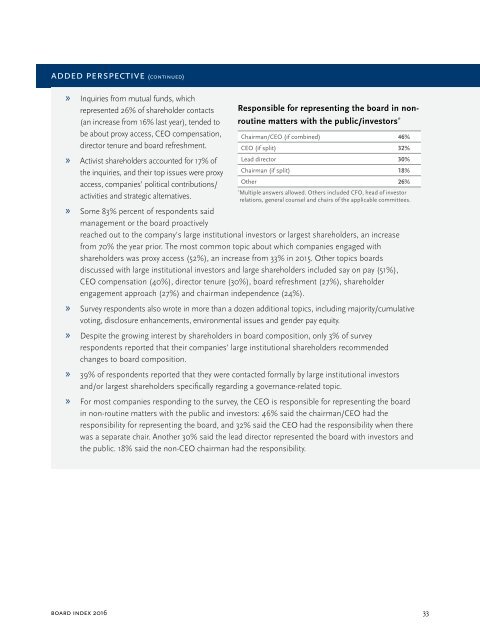Spencer Stuart Board Index
2ipnQXb
2ipnQXb
Create successful ePaper yourself
Turn your PDF publications into a flip-book with our unique Google optimized e-Paper software.
ADDED PERSPECTIVE (continued)<br />
»»<br />
Inquiries from mutual funds, which<br />
represented 26% of shareholder contacts<br />
(an increase from 16% last year), tended to<br />
be about proxy access, CEO compensation,<br />
director tenure and board refreshment.<br />
»»<br />
Activist shareholders accounted for 17% of<br />
the inquiries, and their top issues were proxy<br />
access, companies’ political contributions/<br />
activities and strategic alternatives.<br />
Responsible for representing the board in nonroutine<br />
matters with the public/investors *<br />
Chairman/CEO (if combined) 46%<br />
CEO (if split) 32%<br />
Lead director 30%<br />
Chairman (if split) 18%<br />
Other 26%<br />
*<br />
Multiple answers allowed. Others included CFO, head of investor<br />
relations, general counsel and chairs of the applicable committees.<br />
»»<br />
Some 83% percent of respondents said<br />
management or the board proactively<br />
reached out to the company's large institutional investors or largest shareholders, an increase<br />
from 70% the year prior. The most common topic about which companies engaged with<br />
shareholders was proxy access (52%), an increase from 33% in 2015. Other topics boards<br />
discussed with large institutional investors and large shareholders included say on pay (51%),<br />
CEO compensation (40%), director tenure (30%), board refreshment (27%), shareholder<br />
engagement approach (27%) and chairman independence (24%).<br />
»»<br />
Survey respondents also wrote in more than a dozen additional topics, including majority/cumulative<br />
voting, disclosure enhancements, environmental issues and gender pay equity.<br />
»»<br />
Despite the growing interest by shareholders in board composition, only 3% of survey<br />
respondents reported that their companies’ large institutional shareholders recommended<br />
changes to board composition.<br />
»»<br />
39% of respondents reported that they were contacted formally by large institutional investors<br />
and/or largest shareholders specifically regarding a governance-related topic.<br />
»»<br />
For most companies responding to the survey, the CEO is responsible for representing the board<br />
in non-routine matters with the public and investors: 46% said the chairman/CEO had the<br />
responsibility for representing the board, and 32% said the CEO had the responsibility when there<br />
was a separate chair. Another 30% said the lead director represented the board with investors and<br />
the public. 18% said the non-CEO chairman had the responsibility.<br />
board index 2016 33


